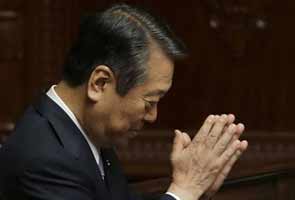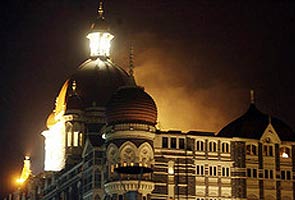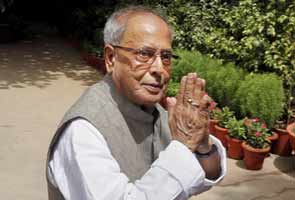Tokyo: Japanese political heavyweight Ichiro Ozawa, one of the key figures behind the ruling party's rise to power, led dozens of lawmakers out of the party on Monday, but the government will retain its majority in the powerful lower house of parliament.
Indeed, the departure of Mr Ozawa, 70, and his followers could put Prime Minister Yoshihiko Noda in a better position to consolidate control on his fractious party and cut deals with the opposition, whose help he needs to pass laws since they control the upper house, which can block bills.
"I'm sure Noda has the champagne on ice. He'll be happy to see the back of Ozawa," said Jeffrey Kingston, director of Asia studies at Temple University's Japan campus.
"Ozawa has a lot of baggage and has just been a headache for the party and Noda in particular."
Mr Ozawa, known as the "Shadow Shogun" for his backroom deals, and his followers quit over a plan to double the sales tax to 10 per cent in three years.
The proposal, aimed at curbing ballooning public debt, was passed by parliament's lower house last week with the help of the opposition. But 57 lawmakers in Mr Noda's Democratic Party of Japan (DPJ) voted against it, with 15 others abstaining or absent.
Forty lower house members and 12 in the upper chamber - many of them rookies - will resign from the DPJ, an aide told reporters. That would bring down the ruling party's numbers in the 480-member lower house to 249 from 289.
However, Kyodo news agency said later the number had been revised to 50 in total after two lower house MPs said they would not leave the party.
Mr Ozawa, whose smaller party merged with the then-opposition Democrats in 2003, has argued the planned tax hike violates campaign pledges made when the Democrats swept to power three years ago, promising to curb the powerful bureaucracy and cut wasteful spending before raising taxes.
Many people are also wary of raising the tax at a time when Japan's recovery from last year's triple blow of a big earthquake, tsunami and nuclear crisis is not yet assured.
But Mr Noda, a former finance minister, has insisted it is vital to get Japan's fiscal house in order and find ways to fund the bulging social welfare costs of a fast-ageing population.
"Noda said he risked his political career to raise the sales tax hike, so he did. His message was that he didn't really care about the party more than he cared about raising the sales tax," said Koichi Haji, chief economist at NLI Research Institute.
"I think the (main opposition) Liberal Democratic Party (LDP) will cooperate in passing through the sales tax hike bills and other budget-related bills through parliament," he added. "This is a positive step forward."
OZAWA'S CLOUT FADING
Japan has suffered a string of credit downgrades in the past two years largely because of its failure to make progress in tackling its debt, already twice its annual economic output and the worst among advanced industrialised countries.
So the tax plan's approval in the lower house marks a milestone for a nation long trapped in a cycle of revolving-door governments and policy gridlock.
Mr Ozawa's defection could well make it easier for Mr Noda to cooperate with the LDP and its one-time partner, the New Komeito party, in getting the legislation through the upper house.
"We can keep the main scenario that tax and social security reform bills will be cleared at the upper house as well," said Kyohei Morita, chief economist at Barclays Securities Japan.
Mr Ozawa, a strategist and master of backroom deals during his four-decade political career, has long been a paradox.
Fans have seen him as a reformer for advocating a bigger global role for Japan and the reduction of bureaucrats' control over policies. Critics paint him as an old-style schemer.

Mr Ozawa was a rising star in the LDP before he bolted in 1993, setting off a chain reaction that briefly ousted the conservative party. He then devoted the next two decades to creating a viable alternative.
But he has suffered setbacks in recent years, including being forced to resign as DPJ leader over a funding scandal before its historic victory in 2009, a win some credited him with orchestrating. He then lost a party leadership race in 2010 and last year, his favoured candidate was defeated by Mr Noda.
Many analysts see his influence now waning, one reason being a generational shift in political circles and voter distaste for the old style politics he came to symbolise.
"Ozawa knows what people want to hear ... (but) it's a popular message by an unpopular man," Mr Kingston said.
 After posting its biggest percentage jump against the dollar in three years on Friday, the Indian currency was on Monday trading marginally higher at 55.57 to the dollar.
After posting its biggest percentage jump against the dollar in three years on Friday, the Indian currency was on Monday trading marginally higher at 55.57 to the dollar. Islamabad: Days after terror suspect Zabiuddin Ansari's revelations about the Mumbai attacks being controlled and facilitated from Karachi, Pakistani authorities have claimed 40 Indian nationals were involved in the terrorist incident.
Islamabad: Days after terror suspect Zabiuddin Ansari's revelations about the Mumbai attacks being controlled and facilitated from Karachi, Pakistani authorities have claimed 40 Indian nationals were involved in the terrorist incident. Mr Ozawa was a rising star in the LDP before he bolted in 1993, setting off a chain reaction that briefly ousted the conservative party. He then devoted the next two decades to creating a viable alternative.
Mr Ozawa was a rising star in the LDP before he bolted in 1993, setting off a chain reaction that briefly ousted the conservative party. He then devoted the next two decades to creating a viable alternative. New Delhi: These are excerpts from the new autobiography by Congress leader Arjun Singh, A Grain of Sand in the Hourglass of Time. The book (Hay House Publishers, India) will be available in bookstore in India starting next week for
New Delhi: These are excerpts from the new autobiography by Congress leader Arjun Singh, A Grain of Sand in the Hourglass of Time. The book (Hay House Publishers, India) will be available in bookstore in India starting next week for  New Delhi: PA Sangma's team has formally objected to Pranab Mukherjee's nomination as a candidate for President of India. Mr Sangma takes on the former Finance Minister in the election scheduled for July 19.
New Delhi: PA Sangma's team has formally objected to Pranab Mukherjee's nomination as a candidate for President of India. Mr Sangma takes on the former Finance Minister in the election scheduled for July 19.